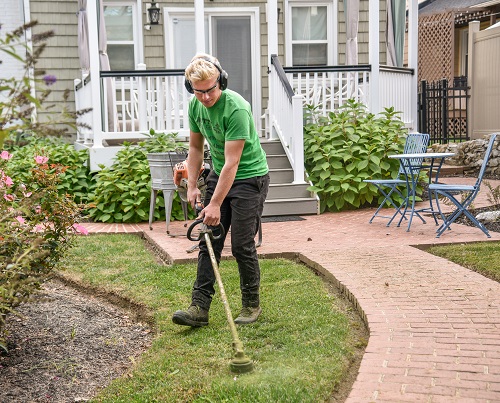Summer is just around the corner, which is the time when many homeowners are looking to beautify their outdoor spaces. It can be as simple as hiring someone to take care of their lawn on a regular basis to having a new deck or fence built. In those cases, they’ll turn to someone in the landscaping business.
According to Innovation, Science and Economic Development Canada, there were more than 23,000 landscaping businesses in 2020. The government notes that four out of every five landscaping businesses were profitable that year. And market research firm IBISWorld predicts the landscaping services industry will rake in $13.8 billion in revenue in 2022. The industry has grown an average of 5% a year over the past five years.
With those favourable numbers and a low barrier to entry, you may have thought about starting a landscaping business. If you’re a fan of the outdoors and don’t have seasonal allergies, this might be the right career choice for you. Learn what it takes to start, manage, and run a profitable landscaping business.

Steps to Take to Start a Landscaping Business
First, you should decide which landscaping services to provide. If you’re the only one involved and have little to no experience, you may want to consider what tasks you can perform on your own. For instance, gardening and mowing will likely be easy for most people. On the other hand, if you haven’t built a deck or fence before and can’t hire anyone to help, it’s probably best to avoid offering those services.
Here are a few types of services you can offer:
- Lawn maintenance and mowing
- Landscape design and planting
- Tree and shrub pruning
- Building retaining walls and walkways
- Fence and deck building
- Start and end of season cleanup
- Corporate landscaping
Second, there will be equipment and tools needed to start your landscaping business. But, again, this will depend on the type of services you offer. In some cases, a regular lawnmower might suffice. But if you get a client with a large property, a riding lawnmower will be able to get the job done quicker and won’t require as much labour. But there will be additional costs. Riding lawnmowers are more expensive, but you’ll also likely have to purchase a trailer to transport it from one site to another.
And third, you’re going to have to know the average cost to start a landscaping business. That will depend on the types of services you want to offer. You can specialize in just lawn mowing and maintenance or provide a variety of services. The more complex your services, the more equipment you’re going to need. You may also need to hire part-time or full-time staff.
How to Create a Landscaping Business Plan
There are many things you should do when creating a business plan for your landscaping business. However, here are the four most important ones:
- Define your target market. Your target market is the people you’ll be marketing your services to, so they’ll hire you. They may be homeowners, investment or seasonal property owners, contractors, large residential property managers, or commercial property managers and owners. They may also be a combination of one or more of the above. Your marketing materials (such as your website, flyers, and ads) should be directed at the types of clients you want to attract. You may even need to create different messages for each client category to win their business.
- Decide how much to charge customers. The cost for your services will depend upon many factors, such as the types of services you’ll provide, the tools and materials you need, the amount of time tasks will take to complete, and the size of the property you’ll be maintaining. Some clients may balk at an hourly rate, so a per-project rate is often best. Prices can also vary depending on the area you serve. In large cities and more affluent neighbourhoods, you should be able to charge more. However, your clientele likely won’t accept Vancouver-type prices in smaller cities or towns. You’ll also need to research to find out what your competitors charge. Call them or check their website to get this information. However, you may be tempted to charge significantly less than your competitors to win business, but don’t. That can make it harder to generate enough sales to cover your costs. You may also need to take on more work and burn out more easily if you charge too little. Somewhere in between what the competition charges are a good starting point. When determining your rate, remember to calculate your expenses (including equipment, fuel, labour, materials, and maintenance costs).
- Register your business. First, you should decide whether you want to register as a sole proprietorship or a corporation. As a sole proprietor, you’re the only one operating the business. Also, the income you earn is taxed at personal tax rates and must be reported on your return. A corporation is a separate legal entity, and the income earned is taxed at a much lower rate. While there are larger startup and ongoing costs and more administrative work, there are some additional tax advantages you and your family can use.
- Get landscaping insurance. Having landscaping insurance will provide you with the coverage required to protect yourself and your business. There are four types of business insurance policies that are recommended for landscapers:
- Commercial general liability insurance, which provides coverage for claims against your business for property damage or third-party bodily injuries.
- Tools and equipment insurance, which will cover the costs to replace or repair equipment or tools if they’re stolen, lost, or damaged.
- Pollution liability insurance, which provides protection against environmental hazards caused by pollution.
- Commercial auto insurance, which covers the vehicles you use to transport materials, tools and equipment, and people.
Tips on How to Grow Your Landscaping Business
Starting a business is usually the easy part, but learning to manage and run a successful landscaping business is more complicated. These landscaping business tips should help get you on the road to growth:
- Set up a referral program. Having this type of program can help persuade customers to recommend your company if you provide them with a discount on future services. It shouldn’t be too large of a discount to turn them into an unprofitable customer, but it should be large enough to help convince your customers to refer you to their friends and family.
- Bundle services. Like how telecommunications companies may offer you a discount when you bundle home internet and TV services together, you can give customers a discount when they use more than one of your services. It may motivate them to purchase more services from you.
- Partner with contractors. When people are renovating their home inside, they might also want to beautify the outside of their house. Connect with a few contractors with good reputations to refer business to you. In return, you can refer your clients to them. It can be lucrative for both of you.
- Work with real estate agents. Many agents want their clients to get a good price for their homes. Having a beautifully landscaped property can attract buyers. Contact a few agents in your area to see if you can get their or their clients’ business. If your work helps get the property sold, you might get more referrals.
- Offer subscription options. Recurring revenue is a good way to have a dependable source of income. Some services may be suitable for a subscription model, such as weeding and mowing. This can be an option for both new and regular customers.
- Diversify your offerings. There are four seasons in most parts of the country, and landscaping services aren’t typically needed in winter. You can offer your clients snow removal services or indoor gardening services to corporate customers. That can help you bring in year-round income instead of living off your savings during the colder months.
- Promote yourself. Unfortunately, one of the few ways to make money is to spend money. That means print (such as newspaper ads or flyers) and digital advertising, building a website, and using social media. You may want to consider creating a weekly blog post offering gardening tips and promoting it on your social media channels. Or you can post before and after client photos on Instagram or Pinterest, which requires less effort.
- Use search engine optimization (SEO). Today, many people use the internet to find a service instead of using the yellow pages. Building an SEO strategy takes time, and it may take months for your site to rank higher. Also, encourage your clients to give you a review on Google. Responding to good and bad reviews also helps your SEO ranking.
- Do a good job. Treat every client as if they’re the best one you’ve ever had. If you wow them, the odds of having a repeat customer who also refers you to others will increase.
Setting Yourself Up for Success
Starting a landscaping business or any business may seem daunting, but it gives you the freedom to be your own boss. Being successful takes a lot of energy and hard work. It also means having a solid business plan and being prepared for the unexpected. The key, though, is providing customers with great work and exceptional client service. That will lead to repeat business for many years to come.
Related Posts
10 Tips for Closing Your Small Business for the Winter
Are you closing up shop for the winter? Ensuring your property is prepared for winter and your valuable contents and inventory are safely stored is vital. See our tips for how small business owners can shut down operations and keep their assets safe.
9 Ways to Celebrate Small Business Saturday in Canada
Take advantage of Small Business Saturday to raise brand awareness and attract new customers as the holiday shopping season heats up. See our list of how you can do that cost-effectively.
10 Insurance Tips for Women Entrepreneurs
Navigating the complexities of acquiring the right type of liability insurance can be daunting for any entrepreneur in any industry. See our insurance tips for helping women-owned businesses and startups make informed decisions.


